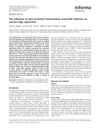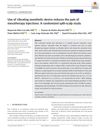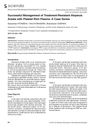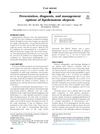
Combining hydroxychloroquine and pimecrolimus can effectively treat hair loss from discoid lupus.

Combining epinephrine with a steroid may help regrow hair in severe alopecia areata cases.
 13 citations,
June 2019 in “Case reports in dermatology”
13 citations,
June 2019 in “Case reports in dermatology” Fat injections in the face can cause hair loss.
 5 citations,
January 2020 in “Skin appendage disorders”
5 citations,
January 2020 in “Skin appendage disorders” Oral dutasteride works better for hair loss, but has more sexual side effects; intralesional dutasteride is a possible alternative.
 January 2015 in “Przegla̧d dermatologiczny”
January 2015 in “Przegla̧d dermatologiczny” Intralesional triamcinolone is the most effective treatment for alopecia areata, followed by excimer light therapy, and then topical minoxidil. The scalp responds better to treatment than the beard area.
 1 citations,
December 2012 in “Journal of Dermatological Treatment”
1 citations,
December 2012 in “Journal of Dermatological Treatment” Injecting triamcinolone acetonide near surgical cuts doesn't greatly affect wound healing but may help in areas with less tension.
 5 citations,
July 2020 in “Journal of Cosmetic Dermatology”
5 citations,
July 2020 in “Journal of Cosmetic Dermatology” A vibrating anesthetic device significantly reduces pain during mesotherapy for hair loss without complications.
 49 citations,
November 1992 in “Archives of dermatology”
49 citations,
November 1992 in “Archives of dermatology” Different treatments for alopecia areata have varying success rates and side effects; intralesional steroids are most effective.
3 citations,
November 2020 in “Dermatologic Therapy” Start with 2.5 mg/mL triamcinolone acetonide for scalp alopecia areata and increase if needed.
 1 citations,
March 2024 in “Skin health and disease”
1 citations,
March 2024 in “Skin health and disease” Vibration assisted analgesia reduces pain during corticosteroid therapy for alopecia.
 2 citations,
January 2022 in “Journal of the American Academy of Dermatology”
2 citations,
January 2022 in “Journal of the American Academy of Dermatology” Virtual reality can reduce pain during scalp injections.
 2 citations,
June 2019 in “Serbian Journal of Dermatology and Venereology/Serbian Journal of Dermatology and Venerology”
2 citations,
June 2019 in “Serbian Journal of Dermatology and Venereology/Serbian Journal of Dermatology and Venerology” Platelet-rich plasma injections can effectively treat stubborn alopecia areata.
January 2020 in “International Journal of Trichology” PRP injections are not effective for long-term treatment of temporal triangular alopecia.
 11 citations,
January 2019 in “Skin appendage disorders”
11 citations,
January 2019 in “Skin appendage disorders” Hyaluronic acid injections can cause hair loss due to blocked blood vessels.
December 2020 in “Forum Dermatologicum” Intralesional triamcinolone acetonide can effectively limit the progression of GLPLS.
 1 citations,
August 2022 in “International journal of women’s dermatology”
1 citations,
August 2022 in “International journal of women’s dermatology” Botox injections may be a safe and effective way to treat severe, itchy skin disease when other treatments fail.
 October 2024 in “Journal of Cutaneous Immunology and Allergy”
October 2024 in “Journal of Cutaneous Immunology and Allergy” Steroid injections improved symptoms and hair regrowth in a woman with a reaction to permanent makeup.
 September 2023 in “Forum Dermatologicum”
September 2023 in “Forum Dermatologicum” Dutasteride injections can help treat hair loss in men and women.
 164 citations,
April 2008 in “Cochrane library”
164 citations,
April 2008 in “Cochrane library” Current treatments for alopecia show no significant long-term benefits.
 118 citations,
April 1998 in “Dermatologic Clinics”
118 citations,
April 1998 in “Dermatologic Clinics” Finasteride and minoxidil are effective for hair regrowth, while treatments for alopecia areata have varying success and continuous treatment is necessary.
 39 citations,
March 2019 in “Dermatologic Surgery”
39 citations,
March 2019 in “Dermatologic Surgery” PRP therapy increases hair density for androgenetic alopecia.
 37 citations,
May 1999 in “Australasian Journal of Dermatology”
37 citations,
May 1999 in “Australasian Journal of Dermatology” Early diagnosis and treatment are crucial for preventing permanent hair loss in various scalp conditions, and while new treatments are promising, more research is needed to evaluate their effectiveness.
 16 citations,
January 2015 in “Current problems in dermatology”
16 citations,
January 2015 in “Current problems in dermatology” Alopecia Areata is an autoimmune hair loss condition that needs more research for better treatments.
 9 citations,
December 2018 in “JAAD case reports”
9 citations,
December 2018 in “JAAD case reports” Lipedematous alopecia involves a thickened scalp and hair loss, with limited effective treatments available.
 3 citations,
May 2019 in “International journal of research in dermatology”
3 citations,
May 2019 in “International journal of research in dermatology” Platelet rich plasma is an effective treatment for alopecia areata.
 3 citations,
November 2016 in “Clinical Pediatrics”
3 citations,
November 2016 in “Clinical Pediatrics” A girl with Crohn's disease developed hair loss from her medication, which improved with treatment but later returned.
 1 citations,
May 2017 in “InTech eBooks”
1 citations,
May 2017 in “InTech eBooks” The document concludes that alopecia areata is an unpredictable autoimmune hair loss condition with no cure, but various treatments exist that require personalized approaches.
 1 citations,
January 2014 in “Hair therapy & transplantation”
1 citations,
January 2014 in “Hair therapy & transplantation” Platelet-rich plasma treatment is not very effective for chronic severe alopecia areata.
 1 citations,
March 2020 in “Australasian Journal of Dermatology”
1 citations,
March 2020 in “Australasian Journal of Dermatology” The paper concludes that recognizing bitemporal alopecia areata is important for early treatment and preventing its progression.
 1 citations,
April 2012 in “Informa Healthcare eBooks”
1 citations,
April 2012 in “Informa Healthcare eBooks” Some medications for inflammation can cause a condition with scalp rashes and hair loss, often linked to Crohn's disease, and may require treatment changes to prevent permanent hair loss.



























